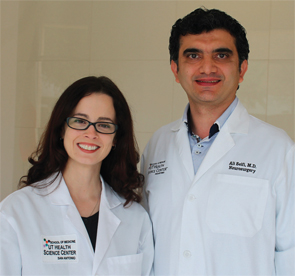Many physicians just don’t feel comfortable with the technology and don’t understand the implications. Others think that recording changes the interaction, because the doctor may become more formal and may use medical jargon instead of easily understood words, knowing that others may review the interaction.
Another concern is the use of the recording if there are adverse outcomes. If the doctor doesn’t mention a zebra, might that lead to a malpractice claim and/or overtreating in a defensive medicine mode?
“The doctor–patient relationship is largely based on trust,” says Dr. Seifi. “I wonder if a patient is secretly recording me because they have lost that trust in my abilities?”
Assessment Required
As with many other things in medicine, a thorough and complete assessment is required before you plan your next moves. You should no more leap to conclusions about this aspect of care than you do any other.

Dr. Seifi (right) with Dr. Rodriguez.
“Patients may have different reasons for wanting to record the encounters with their physician, and it may not necessarily stem from lack of trust,” notes Dr.

Dr. Hausmann
Hausmann. “Sometimes it may be that they trust me to the point that they want to have a verbatim record of what I am saying.”
The patient may feel the need to secretly memorialize the interaction to refer to it later. Both physicians note that it isn’t at all unusual for a patient to say they understand the treatment plans even when they don’t. They just don’t want the doctor to think less of them or are seeking the approval of the practitioner.
“Other patients, especially the younger ones, may tape your interactions without thinking about it,” Dr. Hausmann says. “Some people lead very public lives and document every facet of it to Facebook or Twitter or other social media platforms. To them, the medical interaction is no different.”
“Fire” the Patient?
There are times when the physician may be so concerned they even consider whether the relationship is viable or if they should “fire” the patient.

Dr. Sastow
“If they say they don’t trust the doctor or that they are looking for evidence of how you treated them improperly, then maybe the patient shouldn’t be sitting in front of you,” says Gary Sastow, JD, a partner at Brown, Gruttadaro, Gaujean, & Prato in White Plains, N.Y. “A person coming in with the purpose of catching you doing bad things on tape doesn’t bode well for the relationship.”
Privacy Concerns
Another concern is patient privacy and, as with almost every privacy issue in the U.S., how secretly recording your doctor fits in with the provisions of the Health Insurance Portability and Accountability Act (HIPAA). If it is the patient doing the recording, there are no concerns.


